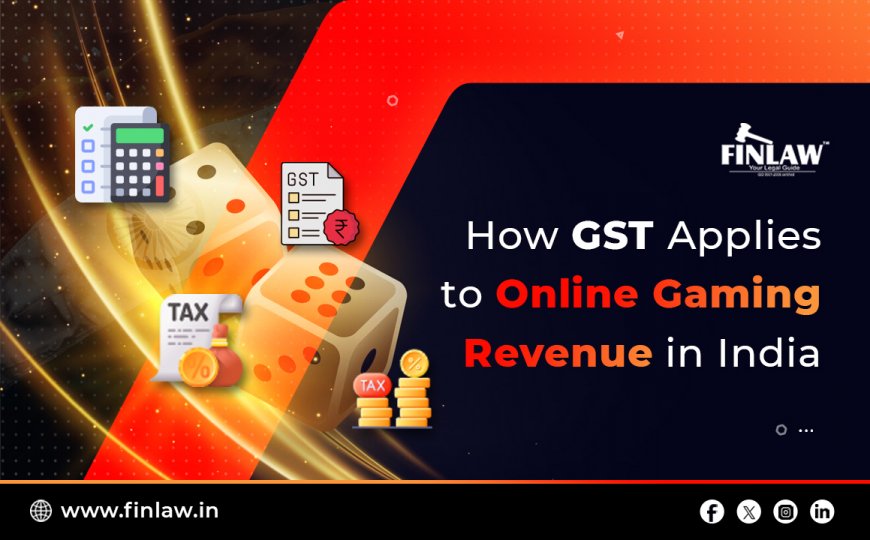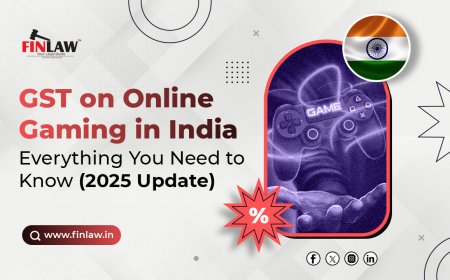How GST Applies To Online Gaming Revenue in India
Explore how GST applies to online gaming revenue in India, its impact on the gaming industry, GST rates for skill and chance games, and compliance tips.

Online gaming has experienced significant growth in India, creating new avenues for entertainment and business. However, this rise has also brought about complex tax implications, particularly concerning the Goods and Services Tax (GST). In this article, we’ll explore how GST applies to online gaming revenue in India, its impact on the industry, and key considerations for businesses.
Understanding Online Gaming Revenue
What Constitutes Online Gaming Revenue?
Online gaming revenue comprises income generated by platforms offering games of skill or chance. It can include:
-
Entry fees for tournaments.
-
Commission on winnings.
-
Subscription or membership fees.
-
Advertising revenue from in-game promotions.
Differentiating Games of Skill and Chance
The classification of games as skill-based or chance-based significantly affects taxation. Skill-based games typically have lower tax implications, while chance-based games like lotteries and betting attract higher GST rates.
Understand The Difference Between Skill Based Gaming and Chance Based Gaming
GST Rates Applicable to Online Gaming
Current GST Structure
The GST rates applicable to online gaming vary based on the game's classification:
-
Games of Skill: A GST rate of 18% applies to platform fees or service charges.
-
Games of Chance: A GST rate of 28% applies to the entire betting or wagering amount.
Impact of Recent Amendments
Recent discussions by the GST Council have proposed a uniform 28% GST rate on the total transaction value for both skill-based and chance-based games. This shift could impact the operational costs for gaming companies and increase the burden on players.
How GST is Calculated for Online Gaming?
For Games of Skill
-
Taxable Amount: Only the platform fee or service charge levied by the gaming operator is subject to GST.
-
Example: If a platform charges ₹100 as service fees on a ₹1,000 game, GST is calculated on ₹100 at 18%.
For Games of Chance
-
Taxable Amount: The entire value of the bet is subject to GST at 28%.
-
Example: If a player places a bet of ₹1,000, GST of ₹280 applies.
Compliance Requirements for Online Gaming Operators
GST Registration
Online gaming operators must register under GST if their turnover exceeds ₹20 lakhs annually (₹10 lakhs for special category states).
Invoice Management
Platforms must issue GST-compliant invoices for all transactions, ensuring transparency and proper reporting.
Regular Filing
Operators must file periodic GST returns (GSTR-1, GSTR-3B, and annual returns) detailing revenue and tax liabilities.
Challenges in GST Implementation
Ambiguity in Game Classification
Differentiating between games of skill and chance remains a grey area, often leading to disputes and legal challenges.
Increased Tax Burden
Uniform high GST rates could deter players and reduce platform revenues, especially for skill-based games.
International Gaming Platforms
Cross-border transactions involving international gaming platforms raise questions about GST applicability and enforcement.
Impact of GST on the Online Gaming Industry
Revenue Generation
High GST rates on chance-based games contribute significantly to government revenue. However, they may discourage participation from players.
Innovation and Investment
A burdensome tax regime could stifle innovation and deter foreign investments in the gaming sector.
Consumer Behavior
Players may shift to unregulated or offshore platforms to avoid high taxes, impacting the domestic gaming market.
Recent Developments and Future Prospects
Government Initiatives
The Indian government is working on clarifying the tax structure to ensure fair treatment for the gaming industry while preventing tax evasion.
Industry Response
Gaming operators are lobbying for differential tax treatment for skill-based games, arguing that uniform taxation hinders growth.
Global Trends
India can draw lessons from international practices where gaming taxes are structured to promote innovation while ensuring compliance.
Key Takeaways for Gaming Businesses
-
Understand Game Classification: Ensure clarity on whether your offerings are skill-based or chance-based to determine applicable GST rates.
-
Invest in Compliance: Maintain robust accounting systems and seek professional guidance to meet GST obligations.
-
Advocate for Reforms: Collaborate with industry bodies to push for a fair and sustainable tax regime.
Conclusion
The application of GST on online gaming revenue is a pivotal issue that shapes the industry's future in India. While the government seeks to optimize tax collection, gaming operators must navigate compliance challenges and advocate for reforms.
For a deeper dive into gaming law and related regulations in India, explore our comprehensive guide on Online Gaming Laws in India. Stay informed to ensure compliance and leverage opportunities in this rapidly evolving sector.
What's Your Reaction?



















